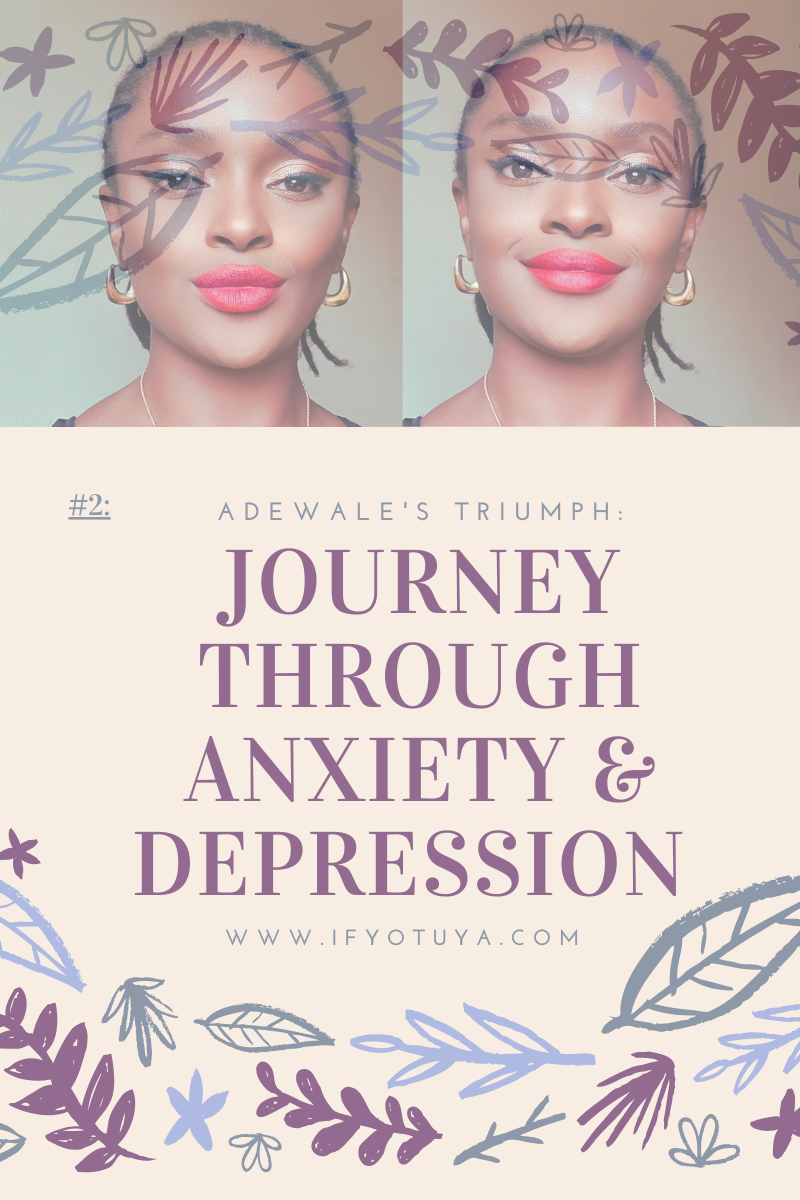– by Ify Otuya
Overcoming a mental disorder is a challenging journey that requires patience, support, self-determination and a combination of different approaches, which can include therapy, medication, lifestyle changes and self-care practices. Adewale’s story reminds us that no matter how hopeless a moment in time may seem, there is always magic to discover on the other side if we can look to connect with others. Read on.
In the bustling city of Lagos, Nigeria, amidst the vibrant tapestry of life, there lived a young artist named Adewale. He had a soul as colorful as his paintings, but behind his radiant smile lay a hidden pain. Adewale had been grappling with severe anxiety and depression, a burden that seemed to grow heavier with each passing day.
In the heart of Lagos, there was a compassionate art therapist named Dr. Amina. She had dedicated her life to the healing power of art, believing that creativity could mend even the most shattered souls. When she learned about Adewale’s struggles, she knew she had to reach out to him.
One fateful morning, Dr. Amina found Adewale sitting alone in a quaint café, his eyes filled with a storm of emotions. She approached him with a warm smile, introducing herself as an art therapist who believed in the transformative power of art.
Intrigued by her gentle demeanor, Adewale decided to give art therapy a chance. He had created art so many times before but this time, he would be creating under the guidance of her voice, in therapy. Dr. Amina provided him with a blank canvas and an assortment of colors, encouraging him to express his feelings through art. At first, Adewale hesitated, unsure of how to convey the turmoil within him.
But with Dr. Amina’s patient guidance, Adewale dipped his brush into the paints and allowed his emotions to flow onto the canvas. Each stroke became a release, and the colors danced to the rhythm of his heart as he listened to Dr. Amina’s voice and talked back in open conversation. Dr. Amina watched as he poured his soul into the artwork, feeling an unspoken connection with every brushstroke.
As days turned into weeks, Adewale’s art became a window into his inner world. The canvas became a sanctuary where he could speak without words and home his unspeakable thoughts, a place where his emotions found solace and understanding as his spirit grew lighter. The transformation was profound – with each piece of art, he unraveled the knots that had bound his spirit.
One day, while Adewale was painting, he met another character who would play a pivotal role in his healing journey – an elderly street musician named Babajide. Babajide had a guitar that sang with the wisdom of ages. He saw Adewale’s pain reflected in his art and offered to accompany it with his melodies.
As the notes of the guitar and the hues of the paintings intertwined, a powerful symphony of healing resonated through the streets of Lagos. Passersby stopped in awe, touched by the raw emotions emanating from Adewale’s art and Babajide’s music. The city became a canvas of compassion, with empathy flowing freely among its people.
Adewale’s art began to gain recognition, and an art exhibition was organized to showcase his masterpieces. The event became a celebration of resilience and hope, drawing crowds from all walks of life. Many who had their own battles with mental health found comfort in Adewale’s artwork, realizing they were not alone.
As the exhibition came to an end, Adewale stood amidst his paintings, feeling a newfound strength in his heart. He knew that he would continue his journey of healing, and he owed it all to the transformative power of art and the unwavering support of Dr. Amina and Babajide.
In the end, this powerful story reminds us that the human spirit is resilient and can bloom even in the darkest of times. It speaks of the magic that happens when compassion, art, and music intertwine, creating a sweet symphony of healing that echoes far beyond the canvas and the strings of a guitar.
Q: In the real world, does art have such a powerful potential in mental health healing?
A: Yes, art indeed has a powerful potential in mental health healing. Art therapy is a recognized form of psychotherapy that utilizes creative processes like painting, drawing, sculpting, music, and other artistic expressions to help individuals explore and understand their emotions, thoughts, and experiences. It can be a valuable therapeutic tool for people dealing with various mental health conditions.
Here are some ways art can have a positive impact on mental health healing:
Emotional expression: Art allows individuals to express complex emotions and thoughts that might be difficult to put into words. It provides a safe and non-judgmental outlet for releasing feelings and pent-up emotions.
Self-awareness: Through the creative process, individuals can gain insights into their own psyche, helping them better understand themselves and their inner struggles.
Stress reduction: Engaging in art can promote relaxation and reduce stress, providing a much-needed respite from daily challenges and anxieties.
Coping skills: Art offers coping mechanisms that can be carried over into daily life, helping individuals manage stressors and triggers effectively.
Self-esteem boost: Accomplishing a creative project can boost self-esteem and confidence, fostering a sense of achievement and pride.
Communication and socialization: For individuals who find it challenging to communicate verbally, art can serve as a means of expression and connection with others.
Distraction and focus: The process of creating art can divert attention from negative thought patterns, allowing individuals to focus on the present moment.
Empowerment: Art therapy empowers individuals to take an active role in their healing journey, fostering a sense of control over their emotions and experiences.
Art’s power lies in its ability to tap into the depths of the human experience, offering a unique and meaningful pathway to healing and growth. It is a testament to the resilience of the human spirit and the beauty of creativity as a force for transformation.
While art therapy is not a standalone treatment for severe mental health conditions, it can complement traditional therapeutic approaches and be a valuable part of an integrative treatment plan. It’s essential to work with qualified art therapists or mental health professionals who specialize in art therapy to ensure the best possible outcomes for individuals seeking mental health healing through creative expression.
This story covers art therapy, depression and anxiety. What other mental health topics would you like to see covered on this blog? Your input matters.
Struggling with mental health or need expert advice? I offer personalized guidance and support rooted in both professional knowledge and lived experience. Let’s work together to create an advisory session that works for you—tailored to your unique needs. Reach out today for an advisory session! +2348086204343.
Author’s Bio:

Hi, I’m Ify Otuya, a mental health advocate and speaker, and also the founder of June E-waste Academy. With expertise in entrepreneurship, my background lies in the arts, e-waste management and marketing. Through my advocacy, I have empowered many to confront mental health challenges and find hope in their journeys. I create articles and empowering mental health recovery stories to inform, grow empathy and compassion for individuals with mental health challenges and to destigmatise mental health.
I am currently building my community to bring hope and to inspire others to live their best lives today. To schedule me for a speaking event or interview, kindly email me at: missotuya@gmail.com. Visit www.ifyotuya.com to join me on my journey towards a mentally fit future for all.


